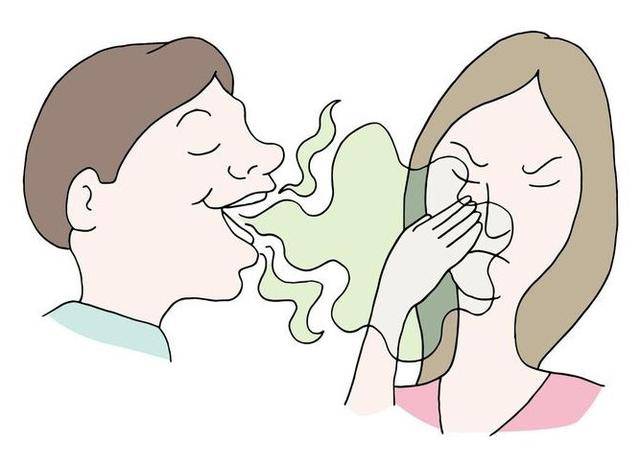During the New Year period, everyone tends to eat well and exercise less. Some people may inevitably feel bitterness in their mouth and bad breath after getting up in the morning, and they find the unpleasant odor in their mouth hard to bear. As a result, the frequency of brushing teeth noticeably increases, and some even brush their teeth before and after breakfast. However, sometimes the unpleasant mouth odor cannot be masked, affecting social interactions.
In fact, the New Year coincides with early spring. From a Traditional Chinese Medicine perspective, spring is a time of growth, when all living things revive and begin to grow and bud. The transformation of yin and yang during this time leads to a natural rise in yang energy, which can easily cause an increase in internal “heat,” resulting in symptoms of excess heat.
Waking up with bitterness in the mouth and bad breath may indicate that there is excess heat!
Excess heat is a term within Traditional Chinese Medicine. Conditions such as bitterness in the mouth, bad breath, oral ulcers, insomnia, dizziness, and red, swollen eyes can arise from excess heat. The specific source of the heat needs to be assessed in context.
1. Liver Heat
Traditional Chinese Medicine believes that the liver corresponds to spring, which emphasizes upward growth. The rise of liver qi can easily lead to excess liver heat, resulting in discomforts such as dry mouth, bitterness, bad breath, dryness and fatigue of the eyes.
Spring can easily cause an overactive liver, and if heat is not promptly reduced, it can consume body fluids, disturb the balance between yin and yang, and may even trigger symptoms like flushed face and dark yellow urine. At this time, it is best to promptly reduce liver heat.
2. Stomach Heat
This season falls during the Spring Festival, and many people consume more greasy and heating foods. If one wakes up with bitterness and bad breath, it could be caused by stomach heat.
Traditional Chinese Medicine holds that the primary function of the stomach is to digest food. If stomach heat is excessive, it can consume more fluids, causing internal dryness, disrupting stomach harmony, and possibly leading to oral ulcers. Therefore, it is also important to reduce this heat in a timely manner.
3. Heart Heat
Waking up with bitterness in the mouth and bad breath may also be due to heart heat. In spring, heart fire can more easily manifest. If one notices a red tip on their tongue along with feelings of irritation, caution is advised, and it’s important to reduce heart heat promptly.
To reduce spring heat, regularly consuming the following four wild vegetables can help!
1. Dandelion
Dandelion is a common wild vegetable in the north, also known as blowball or puffball. In spring, many people go out to forage dandelions. After washing them, they are eaten with dipping sauce. Though slightly bitter, they are very effective in reducing liver heat and stomach heat.
Dandelion has the function of clearing heat and detoxifying, hence referred to as “heat-reducing grass.” It’s an excellent wild vegetable for lowering body heat in spring, especially effective for inflammation of the throat and pharyngitis caused by excess heat.
However, dandelion has a cold nature and should be avoided by those with a weak spleen or stomach to prevent diarrhea.
2. Wild Chicory
Wild chicory is another wild vegetable often eaten in spring, also known as malva. Before flowering in spring, it can be harvested by the roots. It also has a bitter taste and is good for clearing heat, detoxifying, cooling the blood, and promoting urination.
Rich in Vitamin C, carotene, and minerals such as potassium and calcium, wild chicory also helps prevent anemia.
There are many varieties of wild chicory, among which the purple flower variant is nutritionally superior and effective in reducing stomach heat.
3. Mugwort Sprouts
The edible part of mugwort sprouts is the tender stems and leaves. After harvesting, it’s best to blanch them briefly in water, which helps to remove the bitterness. There are various ways to consume them, with many people preferring to use blanched mugwort sprouts to make dumplings.
According to the “Compendium of Materia Medica,” mugwort “calms the mind, nourishes the spleen and stomach, dissolves phlegm, and benefits digestion,” effectively helping to clear heat and strengthen the spleen. Moreover, mugwort sprouts can enhance intestinal peristalsis, facilitating bowel movements and aiding in digestion.
Be cautious: individuals with chronic enteritis should avoid consuming mugwort, as it may lead to diarrhea.
4. Shepherd’s Purse
The tender stems and leaves of shepherd’s purse are edible and can be prepared in many ways. It is nutritious, and many people enjoy using it to make dumplings or wontons.
Shepherd’s purse is rich in dietary fiber, which helps alleviate constipation and also possesses functions such as clearing heat, promoting urination, reducing swelling, and calming the liver.


